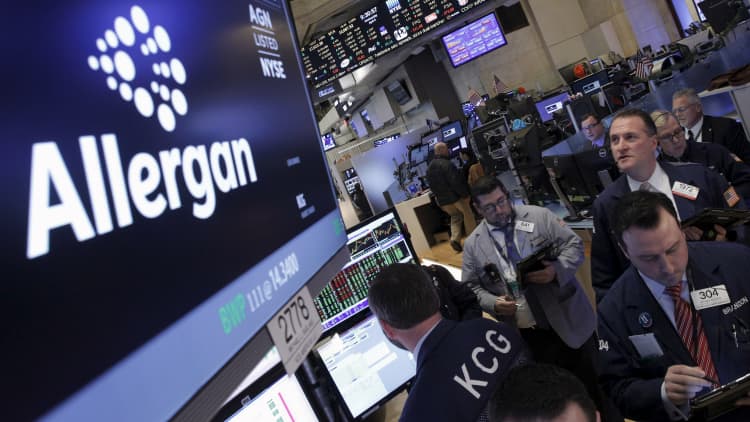
Scrutiny over Allergan's patent partnership with a Native American tribe is ratcheting higher, with Senator Claire McCaskill late Monday calling it a "brazen loophole" she says should be illegal.
Allergan's deal, announced Sept. 8, transferred the patents for its blockbuster eye drug Restasis to the Saint Regis Mohawk tribe. In return, the tribe licensed the rights back to Allergan, and employed its sovereign immunity to move to dismiss certain challenges by generic drugmakers. Allergan paid the tribe $13.75 million upfront in the arrangement, with the potential for $15 million in annual royalties thereafter.
Allergan pointed out at the time the arrangement only affected the challenges in a relatively new system known as inter partes review; the company still faces challenges from generic drugmakers through the traditional federal court system. CEO Brent Saunders said the move was to avoid "double jeopardy" in defending its patents.
Analysts called the deal creative, and Allergan's stock initially rose. But since then scrutiny has mounted, with four democratic senators — Maggie Hassan, Sherrod Brown, Bob Casey and Richard Blumenthal — last week calling for an investigation. Allergan's stock has faltered, and Monday evening, McCaskill joined the fray.
"This is one of the most brazen and absurd loopholes I've ever seen, and it should be illegal," the senator said in a statement to CNBC.
McCaskill, who is ranking member of the Homeland Security & Governmental Affairs Committee, sent a letter to Stephen Ubl, chief executive of the industry lobbying group PhRMA, asking him to consider whether Allergan's deal with the tribe is in keeping with its ethical standards.
The group this year took moves to exclude member companies based on their commitment to research and development, leading to the expulsion of 22 members including Marathon Pharmaceuticals, which had come under scrutiny for its pricing practices.
"Given its recent comments regarding corporate responsibility, PhRMA can and should play a role in telling its members that this action isn't appropriate, and I hope they do that," McCaskill said in her statement.
In the letter, she asked PhRMA's Ubl "to review whether the recent actions Allegan has taken are consistent with the mission of your organization."
"I ask that PhRMA review whether actions to block patent challenges through claims of tribal sovereign immunity align with PhRMA efforts to promote innovation and discourage predatory pricing practices and anticompetitive conduct," McCaskill wrote. "Strong action by PhRMA on this issue may discourage other pharmaceutical actors from employing similar tactics — with the end result of promoting and protecting affordable drug prices for American consumers."
A PhRMA spokeswoman told CNBC in a statement Monday that "as a trade association, we can't comment on individual company business decisions."
But it added that "the threat of inter partes reviews (IPRs), coupled with having to defend patents in multiple venues under different standards, creates significant business uncertainty for biopharmaceutical companies that rely on the assurance of their patents to justify long-term investments needed to discover new treatments and cures."
The association supports reforms to the IPR process, the spokeswoman said.
Allergan pointed out that patents owned by state universities "have been exempted from this same process" of inter partes review, which a spokesman called "deeply flawed."
"Allergan recently completed a Hatch-Waxman trial in a Federal District Court in Texas on the validity of the patents covering Restasis, and a ruling is anticipated in the near future," an Allergan spokesman wrote in an emailed statement to CNBC Monday, referring to the traditional patent-challenge system. "To be clear, if the District Court ruling is adverse to Allergan's patent position, and there is an FDA approval of a generic version of Restasis, that product could enter the market many years in advance of the listed patent expiry dates."
The company reiterated that its agreement with the Saint Regis Mohawk Tribe "has no impact on that case." If upheld, the patents for Restasis are due to expire in 2024.

